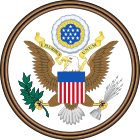Platt Amendment facts for kids
 |
|
| Long title | An Act Making appropriation for the support of the Army for the fiscal year ending June thirtieth, nineteen hundred and two. |
|---|---|
| Enacted by | the 56th United States Congress |
| Citations | |
| Statutes at Large | Chapter 803, 31 Stat. 895, 897 |
| Legislative history | |
|
|
The Platt Amendment was a special rule added to a law by the United States Congress in 1901. It was about the country of Cuba. This amendment gave the U.S. certain powers over Cuba.
It said that any important agreements or treaties Cuba made with other countries had to be approved by the U.S. Senate. It also gave the U.S. the right to step in and handle things in Cuba if there was trouble or if order broke down. The amendment also set aside Guantánamo Bay as U.S. territory.
Contents
What Was the Platt Amendment?
The Platt Amendment was a set of rules that the United States made for Cuba. These rules were added to a U.S. Army funding bill in 1901. It was named after Senator Orville H. Platt, who proposed it.
This amendment was very important for Cuba's future. It affected how Cuba could govern itself and its relationship with the U.S.
Why Was It Created?
The Platt Amendment came about after the Spanish–American War (1898). In this war, the United States helped Cuba gain independence from Spain. After the war, the U.S. military occupied Cuba for a few years.
The U.S. wanted to make sure Cuba remained stable and friendly to American interests. They were worried that other European countries might try to take control of Cuba. The Platt Amendment was seen as a way to protect both Cuba and U.S. interests in the region.
What Did the Amendment Say?
The Platt Amendment had several key parts that limited Cuba's full independence. These rules were later included in Cuba's own constitution.
U.S. Approval of Treaties
One main rule was that Cuba could not sign any treaties with other countries without the U.S. Senate's approval. This meant Cuba couldn't make alliances that might threaten U.S. security. It also stopped Cuba from taking on too much debt from other nations.
U.S. Right to Intervene
Another important part gave the U.S. the right to "intervene" in Cuba. This meant the U.S. could send its military into Cuba if it felt that Cuba's independence was threatened. It also allowed intervention if Cuba's government couldn't maintain order. This rule was used by the U.S. several times in the early 1900s.
The amendment also stated that Cuba must lease or sell certain lands to the United States. These lands were for coaling or naval stations. One of these places became the Guantanamo Bay Naval Base. This base is still used by the U.S. today.
How Did It Affect Cuba?
For Cuba, the Platt Amendment meant that their independence was not complete. Even though they were free from Spain, the U.S. still had a lot of control over their affairs. Many Cubans felt that the amendment was unfair. They saw it as a way for the U.S. to keep Cuba under its influence.
The amendment shaped the relationship between Cuba and the U.S. for many years. It led to periods of U.S. military presence and influence in Cuban politics.
When Did It End?
The Platt Amendment was in effect for over 30 years. It was finally repealed (canceled) in 1934. This happened with the signing of the Treaty of Relations between the United States and Cuba (1934).
However, the part about Guantánamo Bay Naval Base remained. The U.S. still maintains its naval base there today.
Images for kids
-
Guantanamo Bay from satellite images
See also
 In Spanish: Enmienda Platt para niños
In Spanish: Enmienda Platt para niños
 | Leon Lynch |
 | Milton P. Webster |
 | Ferdinand Smith |




